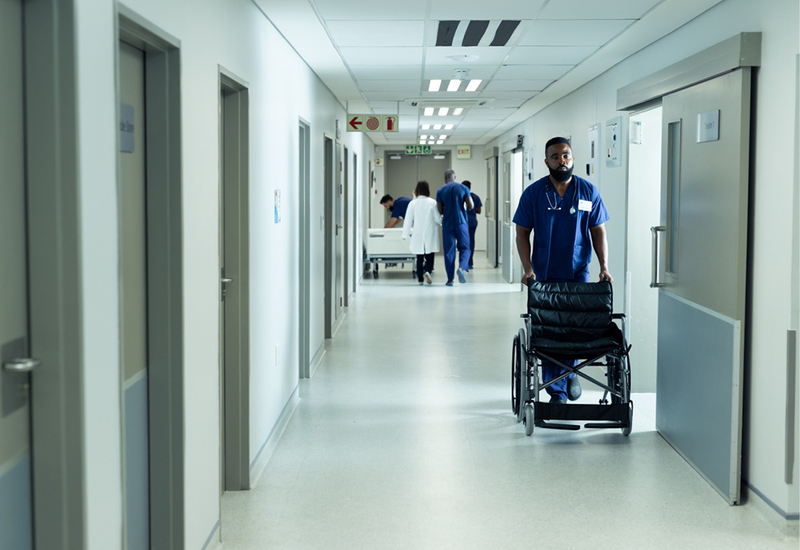
The health service has long been struggling with crippling staff shortages as burnout causes an exodus of doctors from the profession. The system’s shortfalls were particularly hard felt during the pandemic. Despite their colossal workload, doctors continue to see patients every day. Kommersant UK talked to Tatyana Lemeshevskaya, a GP and functional medicine doctor and asked her questions which preoccupy our readers, such as; What’s happened to Covid? Why are young people at risk of cancer? What causes mental health issues in teens? Do we really need legalised euthanasia? How can the NHS overcome its crisis? Read the answers to these questions and more in our interview.

From April to August 2024, there were 83% fewer applicants for healthcare visas than in the same period last year. Why are fewer overseas medics coming to Britain?
First of all, since Britain left the EU, even medical workers already working here have found it more difficult to retain their status or apply for visas. Also, Healthcare Visa holders can no longer bring family members with them. Secondly, economic conditions in the country have become unfavourable, with rising inflation and living costs, so Britain has become less attractive for foreign professionals. Other countries may offer more competitive wages and relocation options. Thirdly, the NHS is currently experiencing staffing and financial issues as working conditions in the healthcare sector deteriorate. Overwork has led many medics to leave the profession. This burnout is felt especially keenly after the pandemic. People who would previously have considered coming here have changed their plans in favour of other countries where conditions are less stressful. Staffing shortages are especially acute in primary care, patients’ first point of contact with the system.

Since the pandemic, 900,000 people have left the workforce due to chronic illness. If this trend continues, in five years this figure will reach 4.3 million, significantly more than other European countries. Why were Britons hit more severely by the pandemic and why has covid subsequently vanished from the news?
The pandemic had a shocking impact on all countries, but Britain faced a specific set of issues leading to possibly more severe consequences for society. Even though Covid has since receded from the news agenda these problems are still felt. The NHS is well known to have long been struggling with a lack of resources and staff problems which the pandemic only exacerbated. The whole healthcare system was already overburdened and the massive wave of patients at the peak of the pandemic caused further delays in the diagnosis and treatment of life-threatening conditions such as cardiovascular disorders, cancers and mental health issues. Problems have built up and diagnosis and treatment has been delayed, leaving patients unable to work. Many others simply lost their jobs because of the pandemic. Unemployment can lead to deteriorating mental health, stress, depression and anxiety about the future as well as physical ailments. The number of people with forms of depression and anxiety disorders has increased, as have sleeping problems, also affecting people’s ability to work. Another debilitating factor affecting people’s capacity to work is long Covid, so the disease hasn’t gone anywhere. It's no longer categorised as a pandemic; now it’s endemic. It has become a routine complaint at our practice, like seasonal flu. Generally, it’s a mild viral infection and most patients recover of their own accord. Only the symptoms must be treated. Patients with comorbidities and health problems are more severely affected by Covid but, as the strains are different, there are no longer such acute cases as we encountered during the first wave of the pandemic.
Has there been a noticeable shift away from the perennial paracetamol to other medications and tests?
I have worked as a doctor for 20 years, both in the public and private sectors and I assure you a GP has in their arsenal far more medicines than just the infamous paracetamol. Maybe a culture clash in approaches to medicine has led you to ask this humorous question. You see, for viral infections, paracetamol is always prescribed. In many countries of the Post Soviet Space, when a patient presents with a cold or other viral infection, a long list of medicines including antivirals are often prescribed. In Britain, there is a different approach; if a patient comes to a GP with a viral infection, treatment of the symptoms is usually recommended, including drinking plenty of fluids and taking paracetamol, as, in the absence of complicating factors, the body can usually deal with ordinary viral infections independently, so the main task is to create conditions that allow the body to do its work. In any case, antivirals only shorten the duration of the illness by a day or two. Still, if the patient's condition does not improve, the symptoms become more acute, or new ones appear, we recommend a repeat consultation where extra testing and other medicines will be prescribed. If necessary, the doctor may refer the patient for urgent tests which can be done on the same day.
Why are GPs so ready to prescribe antidepressants? After all, they’re not psychiatrists.
A GP is a General Practitioner. They treat a multitude of different illnesses without the need to defer to specialists. Specifically, they are authorised to prescribe patients antidepressants for depression or anxiety, especially in the early and middle stages of these disorders. Notably, as well as the treatment of depression and mental illness, these drugs are also used to control the symptoms of various ailments, for instance, chronic pain, irritable bowel syndrome, as a prophylactic against migraines and for the treatment of vasomotor reactions during the menopause. But of course, patients with acute depression require specialist help and are sent to psychiatrists or other specialists. The prescription of antidepressants is a routine part of a GP’s work. People from post-Soviet countries may be accustomed to the functions of therapist, paediatrician and gynaecologist being divided into separate roles in clinics, but here a GP is a family doctor, combining these duties.

What should patients do if paracetamol doesn't help them and they can't get a repeat consultation?
Unfortunately, quite often patients can't get repeat consultations. If it's not possible to arrange an appointment with your doctor, I always recommend choosing any available doctor in the practice, as the history of the medical complaint will be accessible to all of them. An alternative option is to go to an Urgent Care Centre (also called an Urgent Treatment Centre), where patients are seen without prior appointments. It's also possible to call 111, where patients are offered remote or physical consultations with extended-hours GPs at special hubs in their region. These are open outside the working hours of other clinics and they also have access to patients’ medical histories.
In addition to your work as a GP, you also practice functional medicine. What are its strengths and weaknesses, what occasions is this method appropriate for and how does it differ from conventional medicine?
Functional medicine focuses on identifying and removing the root causes of illnesses rather than just treating their symptoms. A diagram of a tree can help visualise how functional medicine works; the symptoms are the leaves, either green, yellowing or brown and dead. The diagnoses are the branches on which the leaves, or symptoms, grow. Conventional treatment focuses on removing the symptoms. To extend the metaphor, this means cutting the branches and stripping the leaves so the tree can recover. Functional medicine seeks answers to the question of why the leaves became ill; there may be rot at the root. This treatment is directed at the source of the problem. Functional doctors have a holistic approach to treatment; they look at the body as a single system, so much attention is given to lifestyle; diet, physical exercise and levels of physical, emotional and social stress, which conventional medicine only investigates very cursorily if at all. This analysis is used to develop an individual treatment plan for recovery, taking into account the specific needs of the patient. There are no one-size-fits-all approaches to treatment, as the same illness may have different causes, just as a single cause might result in various illnesses depending on the patient. An important area in this field is preventative medicine and minimising the risk of disease.
Functional medicine is used when treating disorders of the digestive tract, hormonal disbalances, and metabolic syndromes such as diabetes, insulin resistance, fatty liver disease and heightened cholesterol. While conventional medicine treats endometriosis with oral contraceptives, functional medicine establishes the reasons why the disease has developed; when and where estrogen dominance has arisen, and from what point recovery efforts must begin to reach a balance and not simply reduce the symptoms. Treatment of chronic tiredness receives a lot of attention; this is a vast field of work for functional medicine. Some patients wake up in the morning already feeling tired, with reduced concentration and low work productivity. They go to doctors for testing and everything comes up within the norm, so they are given a clean bill of health and sent home, but they don't get any better. The holistic approach of functional medicine is well-suited to these patients. It's also suitable for those wishing to prevent illness preemptively and improve or optimise their health, as it's better to monitor health parameters when they first stray from the optimal and not when they have gone beyond the norm.
I practice both approaches and I’d like to underscore that a combination of conventional and functional medicine is a powerful approach to treatment as it considers both the symptoms and their root causes. Conventional medicine allows us to quickly avoid acute problems, whereas functional medicine delves deep into the analysis of lifestyle, diet and chronic factors, allowing the underlying causes of the illness to be identified and improving the patient's general state of health.
Do you use artificial intelligence in your work?
When I make decisions in diagnosis and treatment at my doctor's practice, I rely solely on my knowledge and experience. I use AI for educational purposes to improve my communication with patients and boost my medical literacy. It's important for me that patients understand their state of health and what is happening, as then they become more involved in the process. For example, I use 3D models of organs and systems in the body to explain complex medical procedures to patients visually. This helps reduce worry and anxiety before upcoming operations. Technology is a useful tool to improve interactions with patients.
Why are levels of emotional well-being lower in British teenagers than in their European peers?
Every day at my clinic, I encounter teenagers and their families and I notice an increasing trend for people in this age group to have mental health issues. What’s more, anxiety disorders and depression are also now found in younger children, not just teenagers. There is a shortage of mental health support services, which are so overburdened that people can wait several months or sometimes even years to see a specialist. These long waiting times for consultations exacerbate the situation. According to UNICEF statistics, more than half of UK parents in households with children (around two million families) experience either financial problems or mental health issues. Due to financial difficulties, children suffer from a lack of opportunities, stress and depression which is detrimental to their welfare. Most British teenagers rarely spend time in the fresh air or do sports and this lack of physical exercise may play a significant part in their lower levels of happiness.

Why has the incidence of cancer risen so sharply? The King and Kate Middleton have both been diagnosed with cancer. Amongst the Russian diaspora in England, many young women and men are dying of cancer before they even reach 50.
One of the reasons is more effective diagnosis; modern medical technology allows cancer to be identified in the initial stages with greater accuracy than previously. What's more, the environment is a key factor in the occurrence of cancer; worsening pollution, exhaust fumes, the use of plastic packaging, pesticides, genetically modified food and so on. As a doctor of functional medicine, I monitor this closely. For instance, substances derived from plastic with wide applications in different economic sectors may act as endocrine disruptors, also known as hormonal agents, able to disrupt the equilibrium of the human body. An example is drinking water in plastic bottles; after long exposure to sunlight, or in higher temperatures such as in a sauna, phthalates, bisphenols or other compounds which are potentially harmful to the endocrine system may contaminate the water. Consumption of ultra-processed food can also have a detrimental effect on health as can smoking, alcohol and a sedentary lifestyle. All these factors increase the risk of cancer as the body experiences oxidising stress. Cells are harmed as a result of oxidation which destroys them as rust destroys iron. Increasing numbers of aggressive particles called free radicals begin to damage the cells and entire organs, leading to various illnesses including cancer. Another reason is increasing life expectancies. The longer people live, the more time they have to accumulate various illnesses and mutations which may cause malevolent growths. Also, many viruses tend to increase the risk of developing cancer, such as human papillomavirus and Covid. Similarly, hepatitis C and B increase the risk of liver cancer.
Amongst young people, there are many cancer sufferers because urbanisation has led to more exposure to carcinogenic substances from early childhood. Any processes which weaken immunity increase the risk of early-stage cancers because weakened immune systems cannot recognise malevolent cells and neutralise them. There is no direct evidence that stress leads to cancer but it is quite certain that it weakens immunity, so people suffering from chronic stress, depression and heightened anxiety are in a higher-risk group. Of course, genetic predisposition also needs to be taken into account.
What's your attitude to the legalisation of euthanasia?
This touches on the question of where the boundary lies between relieving suffering and the premature termination of life. One of the most important medical principles is to ‘First, do no harm’, or ‘Primum non nocere’. The legalisation of euthanasia is in contradiction to this principle and arouses conflicting feelings amongst doctors. There is a risk some patients, especially the elderly, severely ill or socially vulnerable, may feel pressure from their families or society to choose euthanasia, even if the patients themselves don't want it. This could arise from a feeling that they are a burden for those around them or the healthcare system. A risk, if euthanasia is legalised, is that palliative care might receive less attention and funding, as euthanasia may begin to be perceived as a simpler way of relieving suffering.
7.62 million people are currently on waiting lists for scheduled operations. In your view, how might the systemic crisis in the NHS be tackled?
More funds for the NHS and better budget allocation. Currently, the distribution of resources between primary care (GPs and community services) and secondary care in hospitals is off balance. Due to cuts in funding for important services such as contraceptives for over-25s, health trainers (who help people improve their diets, lose weight and quit smoking) and other services, the burden on primary care has increased significantly. Patients who used to be able to go to specialised clinics now go to GPs’ surgeries. Consequently, GPs are even more overworked, making it more difficult for patients to get appointments, especially those who require either urgent or ongoing care.






